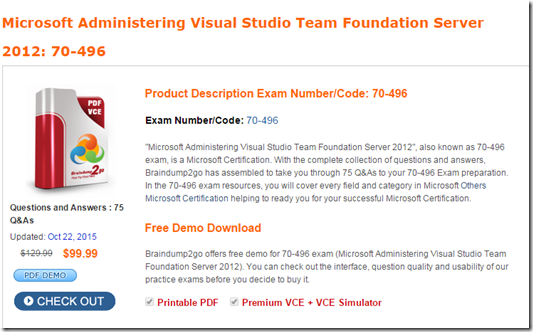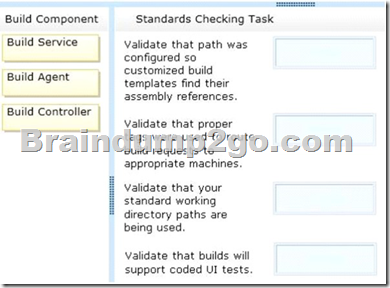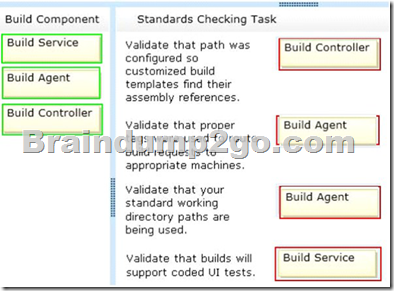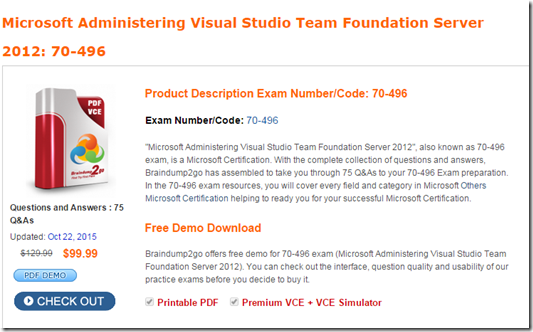MICROSOFT NEWS: 70-496 Exam Questions has been Updated Today! Get Latest 70-496 VCE and 70-4969 PDF Instantly! Welcome to Download the Newest Braindump2go 70-496 VCE&70-459 PDF Dumps: http://www.braindump2go.com/70-496.html (75 Q&As)
We never believe in second chances and Braindump2go brings you the best 70-496 Exam Preparation Materials which will make you pass in the first attempt.We guarantee all questions and answers in our 70-496 Dumps are the latest released,we check all exam dumps questions from time to time according to Microsoft Official Center, in order to guarantee you can read the latest questions!
Exam Name: Administering Visual Studio Team Foundation Server 2012
Certification Provider: Microsoft
Corresponding Certifications: MCSD, MCSD: Application Lifecycle Management
70-496 Dumps,70-496 PDF,70-496 VCE,70-496 eBook,70-496 Book,70-496 Study Guide,70-496 Practice Exam,70-496 Study Material,Exam 70-496 Questions,70-496 Braindumps,70-496 Free Dumps,70-496 Practice Test,70-496 Test Prep

QUESTION 31
Drag and Drop Question
You are the administrator of a Microsoft Visual Studio Team Foundation Server (TFS) installation.
You are configuring a version control proxy server at a remote site.
You need to configure the proxy to cache all collections on MAINCODE and only the CommonLib collection on AUXCODE.
You open the proxy’s Proxy.config file.
Which code segments should you include? To answer, drag the appropriate code segments to the correct cache location. Each code segment may be used once, more than once, or not at all. You may need to drag the split bar between panes or scroll to view content.

Answer:

QUESTION 32
You are planning to install a new Microsoft Visual Studio Team Foundation Server (TFS) 2012 server.
You need to ensure that the minimum supported version of Microsoft SQL Server is installed.
Which version should you install?
A. SQL Server 2005
B. SQL Server 2008 32-bit
C. SQL Server 2008 64-bit
D. SQL Server 2008 R2
E. SQL Server 2012
Answer: D
QUESTION 33
To support your development team’s upgrade from Visual Studio 2010 to Visual Studio 2012, you also upgrade from Team Foundation Server (TFS) 2010 to TFS 2012.
You need to provide a TFS 2012 test environment that:
– Includes data and source code from your existing TFS 2010 environment and
– Allows your developers to test the new TFS 2012 and Visual Studio 2012 features while keeping the current TFS 2010 environment intact.
What should you do?
A. Install TFS 2012 side-by-side on the same server as TFS 2010.
Point TFS 2012 to the existing database, SharePoint, and SQL Reporting Services.
B. Install TFS 2012 on a new server.
Point TFS 2012 to the existing database, SharePoint, and SQL Reporting Services.
C. Clone the existing TFS 2010 environment (including the existing database, SharePoint,
and SQL Reporting Services) on new servers and update the internal IDs.
Upgrade the cloned environment to TFS 2012.
D. Copy the existing TFS 2010 database, SharePoint, and SQL Server Reporting services
to a new set of servers.
Install TFS 2012 side-by-side on the same hardware as TFS 2010, and point TFS 2012
to the new servers.
Answer: C
QUESTION 34
Drag and Drop Question
Your network environment includes a Microsoft Visual Studio Team Foundation Server (TFS) 2012 server with one project collection and multiple build machines.
A development team installs and configures a build service on a new build machine.
You need to be able to validate that the installation and configuration meets your organization’s requirements and follows its best practices.
At which service would you perform the following tasks? (To answer, drag the appropriate build component to the correct standards-checking task in the answer area. Each build component may be used once, more than once, or not at all.)

Answer:

QUESTION 35
Your network environment includes a Microsoft Visual Studio Team Foundation Server (TFS) 2012 server and a virtual test environment that uses Lab Management 2012 along with System Center Virtual Machine Manager (SCVMM) 2010.
You want to install a test virtual machine that is hosted within a lab environment.
You need to ensure that the test virtual machine can support all the features of Lab Management 2012.
Which component should you install on the test virtual machine?
A. Agents for Visual Studio 2012
B. Visual Studio Build Agent 2012
C. Visual Studio Test Agent 2012
D. Visual Studio Lab Agent 2012
Answer: A
QUESTION 36
Your network environment includes a Microsoft Visual Studio Team Foundation Server (TFS) 2012 server named TFS1.
SharePoint and Reporting Services components are also installed and configured for TFS on the same server.
You need to be able to access the SharePoint Project Portal from the TFS server by using the following URL:
http://tfs.fabrikam.com.
What should you do?
A. From the TFS Administration Console, edit the SharePoint Web Application URL.
B. From Visual Studio Team Explorer, edit the portal settings.
C. Run the TFSC0nfIg.exe SharePointportal command.
D. From the SharePoint Central Administration website, configure the Alternate Access
Mappings.
Answer: D
QUESTION 37
Your network environment includes a Team Foundation Server (TFS) 2012 named TFS1 that contains two project collections named PC1 and PC2.
A build server named Bi is configured with a build controller named C1 and an agent named A1 that runs build definitions created in Pd.
A development team wants to create a gated check-in build definition on PC2.
You need to perform a supported infrastructure enhancement to run PC2 build definitions.
What should you do?
A. Add a new build server (B2).
On the B2 build server, migrate controller C1 and install a new controller (C2) that connects
to the PC2 project collection.
On the Bi build server, configure a second build agent (A2) that uses the C2 controller.
B. Add a new build server (B2).
On the B2 build server, install a build controller (C2) that connects to the PC2 project
collection.
On the B2 build server, configure a second build agent (A2) that uses the C2 controller.
C. On the Bi build server, configure the C1 controller to connect to project collections PC1
and PC2.
On the Bi build server, update the Al agent to use controllers C1 and C2.
D. On the Bi build server, configure the C1 controller to connect to project collections PC1
and PC2.
On the Bi build server, configure a second build agent (A2) that uses the C2 controller.
Answer: B
QUESTION 38
Your network environment is configured according to the following table:
Your TFS environment is configured with the following URLs:
– TFS:http://tfssrv: 8080/tfs
– Reporting:http://tfssrv/reports
– SharePoint:http://tfssrv/sites
You need to configure only the TFS URL to be the following fully qualified domain name (FQDN):
http://tfs.contoso.com.
You log on to the application-tier server.
What should you do next?

A. In the IIS Manager, select TFS Website and configure the host name with the friendly name.
B. In the TFS Administration Console, go to the Change URIs dialog box and enter the friendly
URL in the Notification URL text box.
C. In the IIS Manager, select TFS Website and configure the server URL with the friendly name.
D. In the TFS Administration Console, go to the Change URIs dialog box and enter the friendly
URL in the Server URL text box.
Answer: B
QUESTION 39
You have a team project that was created by using the MSF for CMMI Process Improvement v5.0 process template.
You need to ensure that developers are required to enter the name of the project manager when checking in changesets.
What should you do?
A. Add a required field to the Task work item type.
B. Add a required checkin note to the team project.
C. Add a Builds checkin policy to the team project.
D. Add a Work Items checkin policy to the team project.
Answer: B
QUESTION 40
Your network environment includes a Microsoft Visual Studio Team Foundation Server 2012 (TFS) server.
A single build machine is installed with one controller and two agents.
The working directories are configured to use the following working directory:
$(SystemDrive)\Builds\$(BuildAgentId)\$(BuildDefinitionPath).
Your system drive is running out of space and some builds often fail with the following error:
“The specified path, file name, or both are too long. The fully qualified file name must be less than 260 characters, and the directory name must be less than 248 characters.”
You need to meet the following requirements:
– Point the working path to driveD.
– Construct a working directory that can be used to define the shortest unique path for each build agent it is used on.
What should you do?
A. Set the Build Agent working directory path to D:
\BId\$(BuildAqentld)\$(BuildDetinitionPath).
B. Create a system variable named BuildDrive and set its value to D: \.
C. Set the Build Service working directory path to D:
\BId\$(BuildAqentld)\$(BuildDefinitionPath).
D. Set the Team Foundation Build variable named $(BuildDrive) to the value D: \.
Answer: A
Want to be 70-496 certified? Using Braindump2go New Released 70-496 Exam Dumps Now! We Promise you a 100% Success Passing Exam 70-496 Or We will return your money back instantly!

FREE DOWNLOAD: NEW UPDATED 70-496 PDF Dumps & 70-496 VCE Dumps from Braindump2go: http://www.braindump2go.com/70-496.html (75 Q&A)